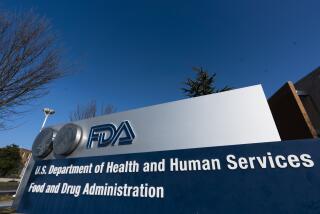Gene’s Link to Colon Cancer Disputed
- Share via
A genetic mutation found in 7% of Ashkenazi Jewish families in the United States does not necessarily lead to colon cancer. Dr. Bert Vogelstein of the Johns Hopkins Oncology Center had reported in September that the presence of one form of the APC gene in members of a family with a history of colon cancer sharply increased their risk of the disease. But a team from the Fox Chase Cancer Center in Philadelphia reports today in Cancer Research on a similar study of families with a history of ovarian or breast cancer. They found no increased risk of colon cancer among those with the aberrant form of the gene, suggesting that the gene may increase the risk of colon cancer, but is not a prerequisite for its development.
Epilepsy Drug Can Halt Useful Seizure Indicator
A new drug for epilepsy, lamotrigine, is effective at suppressing seizures, but it can abolish the warnings that epileptics often get before a fit, thereby increasing the risk of injury. Such warnings, called auras, can last for seconds to minutes before a seizure, and can give the patient time to sit down or take other measures for self-protection.
Researchers from Sultan Qaboos University in the Sultanate of Oman report in the Dec. 13 Lancet on three patients who had auras before switching to lamotrigine and lost them afterward. One had two serious injuries during seizures and another had frequent minor injuries. The team cautioned that patients switching to the drug should be warned about the potential aura loss.
Getting to the Genetic Root of Allergies
Scientists have tracked down a mutant gene that appears to make people more susceptible to allergies. Experts have long noticed that allergies run in families, and they believe that many genes, a dozen or more, are involved.
The latest discovery, at St. Louis’ Washington University School of Medicine, implicates a gene that controls a single step in the inflammatory process that leads to asthma. People who have this gene are 10 times more likely to be allergic than those who do not, the researchers reported in the Dec. 11 New England Journal of Medicine. Experts hope to use the information to tailor new therapies.
Schizophrenia Drug Cuts Alzheimer’s Delusions
A schizophrenia medicine is showing promise in treating some complications of Alzheimer’s disease: the aggression and delusions that lead patients to attack loved ones and nursing-home workers. A study of 625 patients in 40 U.S. nursing homes and hospitals found that low doses of risperidone helped calm about a third of patients with Alzheimer’s and similar dementia without the side effects of standard treatment, such as extreme sedation.
Dr. Ira Katz of the University of Pennsylvania told a psychiatric meeting in Hawaii that 36% of study patients who took 1 milligram a day had a 60% improvement in psychotic symptoms, compared to 22% of patients who took a dummy pill.
New Technology Aids Bone Marrow Transplant
New technology that enables bone marrow to be transplanted from one person to another even when there is no precise genetic match will make this medical procedure more readily available, Philadelphia researchers say. Bone marrow transplants can be the only hope for patients with leukemia and other blood diseases, but thousands die each year before they can find a suitable donor. Dr. Suzanne Ildstad of Allegheny University told a San Diego meeting of the American Society of Hematology that a new technique allowed 24 patients to receive marrow that didn’t match theirs, a process doctors used to consider deadly. The key to the procedure is the use of a so-called facilitator cell, isolated by Ildstad from bone marrow, that enhances acceptance of foreign marrow cells.
--Compiled by Thomas H. Maugh II






